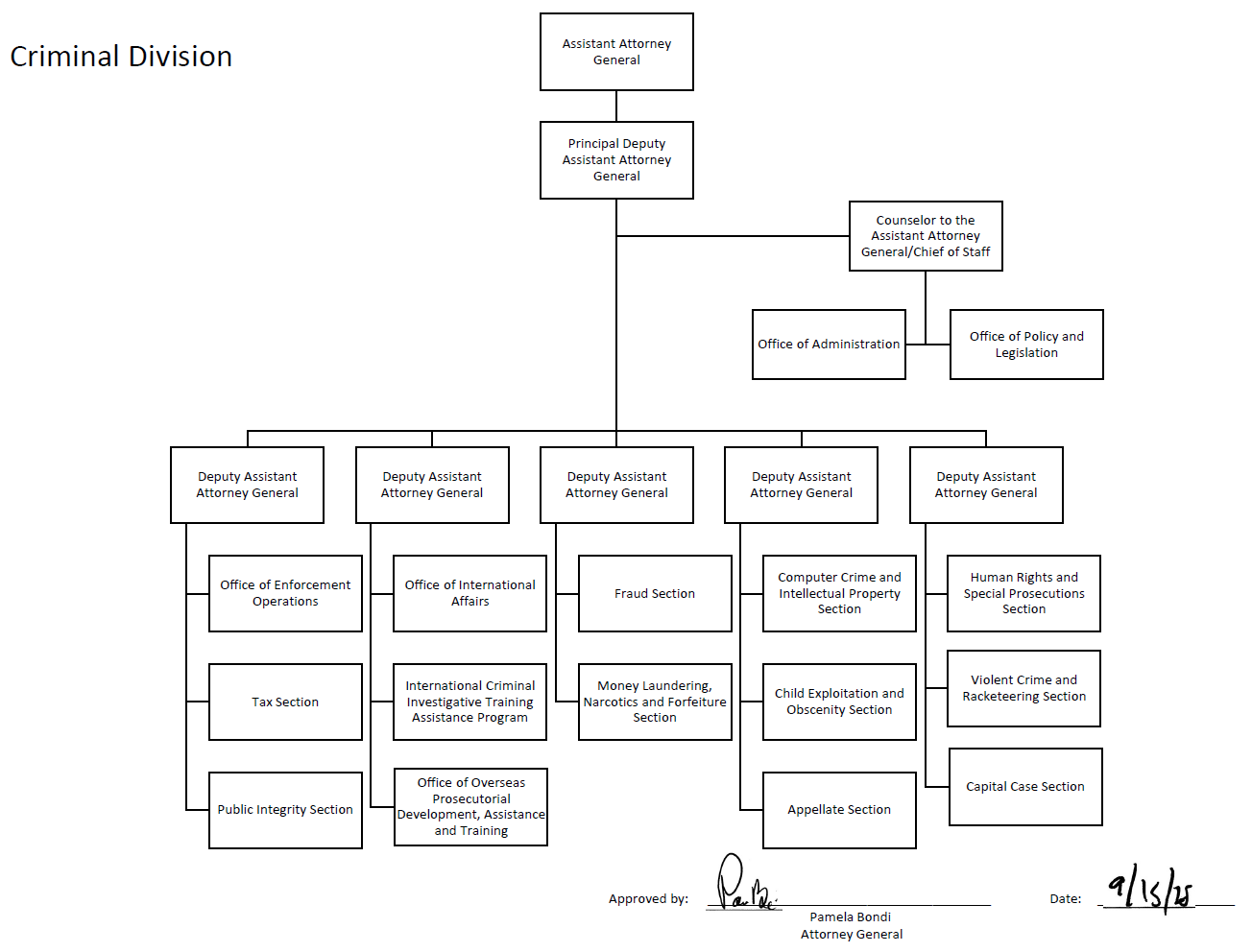Criminal Division
Criminal Division Organizational Chart - printable PDF
- Assistant Attorney General
- Principal Deputy Assistant Attorney General
- Counselor to the Assistant Attorney General/Chief of Staff
- Office of Policy and Legislation
- Office of Administration
- Deputy Assistant Attorney General
- Office of Enforcement Operations
- Tax Section
- Public Integrity Section
- Deputy Assistant Attorney General
- Office of International Affairs
- International Criminal Investigative Training Assistance Program
- Office of Overseas Prosecutorial Development, Assistance and Training
- Deputy Assistant Attorney General
- Fraud Section
- Money Laundering, Narcotics and Forfeiture Section
- Deputy Assistant Attorney General
- Computer Crime and Intellectual Property Section
- Child Exploitation and Obscenity Section
- Appellate Section
- Deputy Assistant Attorney General
- Human Rights and Special Prosecutions Section
- Violent Crime and Racketeering Section
- Capital Case Section
- Counselor to the Assistant Attorney General/Chief of Staff
- Principal Deputy Assistant Attorney General
Approved by Pamela Bondi, Attorney General, on September 15, 2025
History
The Criminal Division was created by Attorney General Alexander Mitchell Palmer in his reorganization of the Department of Justice in 1919.
Mission
The mission of the Criminal Division is to serve the public interest through the enforcement of criminal statutes—and related civil statutes—in a vigorous, fair, and effective manner; to exercise general supervision over the enforcement of all federal criminal laws, with the exception of those statutes specifically assigned to other divisions; and to build the capacity of our foreign rule of law counterparts.
Major Functions
The major functions of the Criminal Division are to:
- Develop, enforce, and supervise the application of all federal criminal laws, and related civil statutes, except those specifically assigned to other divisions of the Department.
- Conduct and supervise a wide range of criminal investigations and prosecutions, including international and national drug trafficking and money laundering organizations; international organized crime groups; corrupt public officials; human rights violators; international and domestic human smugglers and traffickers; domestic and international child exploitation enterprises; domestic and international hackers; and individuals and organizations responsible for a variety of criminal conduct, including violent crime, financial fraud and misconduct or for endangering public health and safety, including through the distribution of unsafe drugs, medical devices, and food.
- Approve and oversee the use of the most sophisticated investigative authorities authorized by law, including reviewing all federal electronic surveillance requests in criminal cases and authorizing participation in the Witness Security Program.
- Advise the Attorney General and other senior leadership within the Executive Branch on matters of criminal law.
- Coordinate with foreign countries to secure the return of fugitives and obtain evidence and other assistance from abroad and assure that the United States meets its reciprocal obligations to treaty partners.
- Formulate and implement criminal enforcement policy and provide advice and assistance to all levels of the law enforcement community, including providing training to federal, state, and local prosecutors and investigative agencies.
- Help develop and strengthen foreign criminal justice systems that can combat transnational criminal organizations and terrorism consistent with international standards and in furtherance of U.S. national security.
- Lead the Department’s Asset Forfeiture Program, including by providing legal, policy, and expert guidance on asset forfeiture, maximizing the potential of asset forfeiture Department-wide, administering the Asset Forfeiture Program’s victim compensation and law enforcement sharing programs, and providing training to federal, state, local, tribal, and foreign law enforcement.
- Administer the U.S. Victims of State Sponsored Terrorism Fund, which provides compensation to victims of state sponsored terrorism pursuant to statute.
- Enforce federal criminal tax law and related criminal laws to promote voluntary compliance with tax laws, maintain public confidence in the integrity of the tax system, and promote the sound development of law.
- Build capacity of foreign law enforcement and rule of law counterparts through training, mentorship, and the deployment of Criminal Division attachés to embassies around the world.


